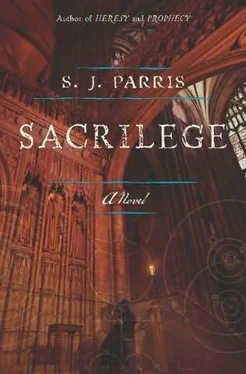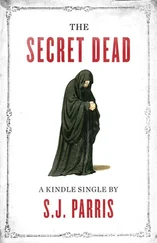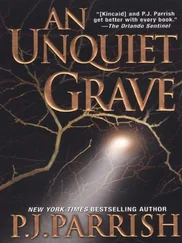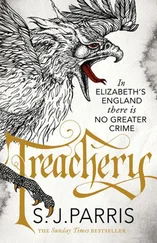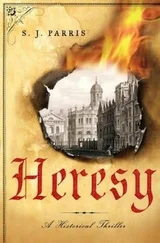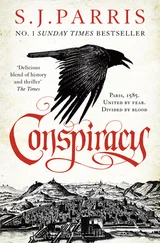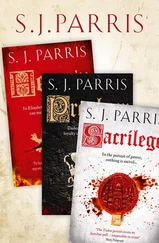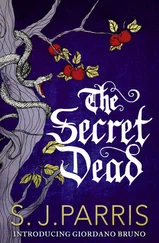“Fitch, I expected you after dinner, did you not get my message? I sent a boy this morning.” He gave me a brisk nod as he swept past and leaned his considerable bulk over the counter.
“Very good, Doctor Sykes,” the apothecary said, unruffled, inclining his head in a gesture of deference. “We were just talking about you. Still wearing your defence against the plague, then?”
The doctor narrowed his eyes, unsure if he was being mocked. “Well, I am not dead of it yet. Aromatic herbs,” he said, for my benefit, pointing to his beak. “Keeps the plague miasma at bay. William, I must speak business with you.” He tapped on the ware bench, his voice impatient. “In private.”
“I have not forgotten, Doctor Sykes—just let me finish up with my customer. I was telling our Italian visitor here how many prominent citizens you attend in Canterbury, and how your services are so much in demand.”
Sykes turned to look me full in the face at this, peering closer as if he were shortsighted. The ring of fat between his jaw and his collar protruded as he did so, putting me in mind of a toad puffing out its throat.
“Quite so. Which is why I do not have time to stand about in idle chatter. Italian, you say? What brings you to Canterbury? Do you have friends here?”
“I stay with Doctor Harry Robinson at the cathedral. We have friends in common and I wished to see your beautiful city.”
Sykes squinted, nodding. “Ah, yes, Harry. Well, you are welcome to Canterbury, sir. And now, if you would excuse us. Fitch—close the shop behind this gentleman, would you, while we go inside?” He gave me an oily smile.
Fitch hurried to obey, ushering me towards the door with an apologetic gesture.
“Come back first thing tomorrow, signor, if your stomach is not cured.” He held the door for me, with another of his jerky little bows. “I will offer again my tonic and you won’t regret it, I swear.”
“Thank you—I may take you up on that,” I said, with every intention of revisiting the talkative apothecary as soon as possible.
As I stepped back into the dust and bustle of the street I heard Sykes hissing, “Who was that?”
I took a narrow road leading off the High Street in the direction of the cathedral tower, keeping my kerchief tied close around the lower half of my face in the hope of avoiding too much attention. As I walked, I glanced about me as unobtrusively as I could. Now that Fitch had mentioned the presence of the constables I felt even more conscious of how oddly I must stand out. Where the street opened into a small market square with a stone cross in its centre, I noticed a ginger-haired man in dark breeches and doublet loitering with an air of purpose, restless eyes flitting from right to left along the streets branching away from the square, hand lightly on the hilt of his sword. Was this one of the parish constables? Behind him, incongruous between two ordinary-looking houses, rose a great gatehouse with two octagonal towers four storeys high, built of pale stone intricately carved in the perpendicular style, a row of escutcheons and Tudor emblems painted in bold heraldic colours spanning the width of it above the gateway. Through the larger of the two open doors, a central arch high enough to admit horses and carts, I glimpsed for the first time the precincts of the famous cathedral.
I pulled the cloth from my mouth and stepped into the shade of the gatehouse, conscious of the man with the sword watching me from across the square with less than friendly curiosity. I met his eye briefly and looked away to find myself face-to-face with a tall, broad-set man in a rough tunic, who barred my way through the gate, crossed his thick arms over a barrel-like chest, and demanded to know my business in the cathedral.
“I am here to see the Reverend Doctor Harry Robinson,” I offered, with an ingratiating smile.
“Expecting you, is he?” He didn’t move.
“Yes, he is. And I carry a letter of recommendation from a mutual friend at the royal court in London.”
His round face twitched with uncertainty; I guessed he was in his mid-twenties, though there were already creases at the corners of his eyes that deepened with anxiety. I brought out the paper and pointed at the imposing wax seal.
“The crest of Sir Philip Sidney, nephew to the Earl of Leicester,” I added, for effect. He glanced uneasily over his shoulder, then nodded.
“Do you go armed, sir?”
I held my palms out, empty. “Only this little knife.” I indicated the sheath at my belt.
“I must ask you to leave it with me. No weapons in the cathedral precincts, by order of the dean. Not after …” He hesitated, then appeared to think better of it and held out his hand for the knife. I noticed his left hand was wrapped in a dirty bandage with rust-coloured patches of blood on it.
“There was a murder, I understand.” I unstrapped the knife from my belt and passed it over.
“Yes, sir.” A guarded expression tightened his features. “The dean has taken precautions now, though. There is a watchman who patrols the precincts after dark, and the gate is always kept locked, so you need not be concerned on that account.”
“A little late for the poor fellow who was struck down,” I remarked lightly. “Robbers, I suppose?”
“I couldn’t say.” He shifted his large bulk uneasily from one foot to the other, scratching at his patchy stubble. “If you go to the right of the cathedral, past the conduit house, you will see a row of narrow lodgings before you get to the Middle Gate. Doctor Robinson’s is the fourth along.” He pointed through the gateway; unlike the apothecary, he showed little appetite for talk of the murder.
“Thank you. What is that handsome building opposite?” I gestured towards a large red-brick mansion visible through the archway, just to our left.
“The Archbishop’s Palace.”
“I heard he is never here.”
“You heard right. The dean lives there mostly.”
He fell silent again, squinting up at the sky and absently weighing my knife in his hands.
“Take care of that. I am very attached to it.”
He frowned, as if I had insulted his competence, and stepped aside to let me pass, though I could feel him watching me as I entered the sacred precincts of what had been one of the greatest churches in Christendom.
Stepping out of the gatehouse into sunlight, I almost forgot my purpose as I took in the sight before me. I am no stranger to beauty in architecture; my travels have taken me through many of the finest cities of Europe—though not always by choice. I have taken Mass in the towering basilicas of Rome and Naples, walked the streets of Padua, Geneva, and Toulouse, attended services at the magnificent cathedral of Notre Dame de Paris in the company of the king of France. But the austere beauty of this proud monument to England’s faith made my breath catch in my throat. The spires of its great towers rose perhaps two hundred feet above me, stone pale as ivory against the fierce blue of the summer sky, gilded by the afternoon sun so that it seemed lit as if by divine light. Its height, its severe perpendicular lines, its vast windows all contributed to an overwhelming grandeur that could not help but make you shrink into yourself a little. What effect must its splendour have had on the hundreds of thousands of pilgrims who first set eyes on this view after days of dragging their weary feet across the English downs? A cathedral such as this one, I thought, was intended to humble onlookers; a testament to the glory of God, perhaps, but more obviously to the might of the Church that built it. Standing at the foot of its bell tower, you could never forget your own insignificance. By the same token, might not the men who held positions of authority here also develop a distorted sense of their own power?
Читать дальше
Конец ознакомительного отрывка
Купить книгу
